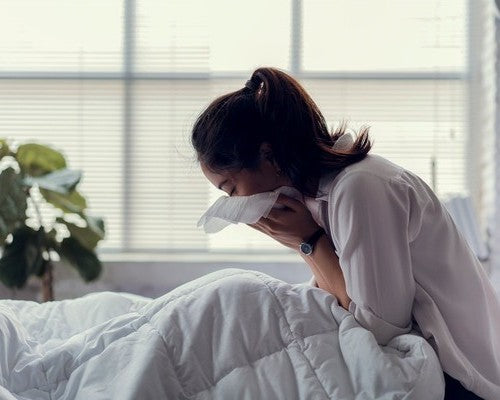With new viruses spreading and old viruses cropping up again, it’s becoming increasingly important to protect yourself and your loved ones from infection, whether it’s from bacteria, viruses, or insects. But there are some products that, while protecting you against diseases, may have other adverse effects on your health. Read on to find out how infections happen, what you can do to protect yourself, the chemicals you should be wary of, and the natural insect repellents and natural disinfectants that can help.
How Infections Happen
According to Harvard Health Publishing, infections are “caused by microscopic organisms known as pathogens—bacteria, viruses, fungi, or parasites—that enter the body, multiply, and interfere with normal functions.” They further state that these microbes typically enter the body through our noses, mouths, ears, anuses, and genital passages, and may also be transmitted through insect or animal bites. These infections could lead to illness and even death, and is especially problematic for those who are already sick and have weakened immune systems.
As the U.S. Centers for Disease Control states, germs don’t move themselves. Some of the ways they’re transferred from person to person are:
- • Contact, whereby an infected person’s hands come into contact with high-touch surfaces which other people then touch (such as doorknobs and elevator buttons).
- • Droplets from an infected person’s cough or sneeze, which then land on the eyes, nose, or mouth of a person in close proximity.
- • Inhalation of airborne pathogens, which are transmitted also via coughing sneezing, or even talking.
- • Good hygiene is therefore paramount when it comes to keeping infections at bay.
Preventing Infections
The experts at Harvard have the following tips for good hygiene habits:
- • Wash your hands well. This is especially important when you or people around you are sick, but should also be done after you use the bathroom, before and after handling food, petting your dog or cat, or taking care of a sick person. Take note: You don’t need to use an antibacterial soap when you wash your hands; it’s more important to wash them properly—wet hands; lather up and scrub the soap into your palms, the backs of your hands, and under your nails; rinse, then dry. (Microbes more easily attach to wet surfaces so that last step is important.)
- • Cover when you cough or sneeze. And don’t use your hands! Use a tissue or the crook of your elbow.
- • Avoid direct contact with potentially infected items like dishes, glasses, utensils, and used tissues and handkerchiefs. Be mindful when coming into contact with high-touch surfaces—use your elbow to hit the elevator button, for example, instead of your fingers.
If you’re caring for a sick person at home, it’s best to disinfect surfaces they’ve come into contact with. But pay attention to the cleaners that you use; some may contain harmful chemicals like ammonia and bleach, which, when not used properly, can be poisonous to humans and pets and may irritate your skin, eyes, nose, and throat. Natural disinfectants you can use include:
- • White vinegar (a good alternative to bleach)
- • Vodka (which has a high alcohol content and can thus fight off mold and mildew)
- • Lemon (which has been shown to kill germs on hard surfaces with a bonus fresh scent)
- • Essential oils (tea tree oil, citronella, lemongrass, and patchouli are some popular ones—mix them with vodka, or with soap and water)
To protect yourself from bugs, keep the following tips from Harvard Health Publishing in mind:
- • Use insect repellents. The experts at Harvard state that those containing DEET and picardin are OK but the U.S. Environmental Working Group stresses that those with DEET should be used as directed and that it’s safest to go for the lowest effective concentration (avoid those with over 30% DEET). If you’re uncomfortable with those chemicals, you can opt for a natural insect repellent with oil of lemon eucalyptus—you may have to reapply constantly though as the EWG has found evidence that it has a maximum protection time of only two hours.
- • Limit outdoor activity in the early morning and evening, when mosquitoes are likely to feed.
- • Get rid of standing water to prevent mosquitoes from breeding. This can be found in vases, uncovered water basins, and canals.
- • Just as important as keeping yourself safe from infection is keeping other people around you safe—if you’re sick, be extra mindful about spreading germs and stay home if you need to.
sources:
health.harvard.edu
cdc.gov
realsimple.com
ewg.org





